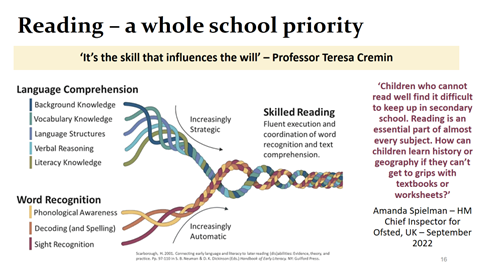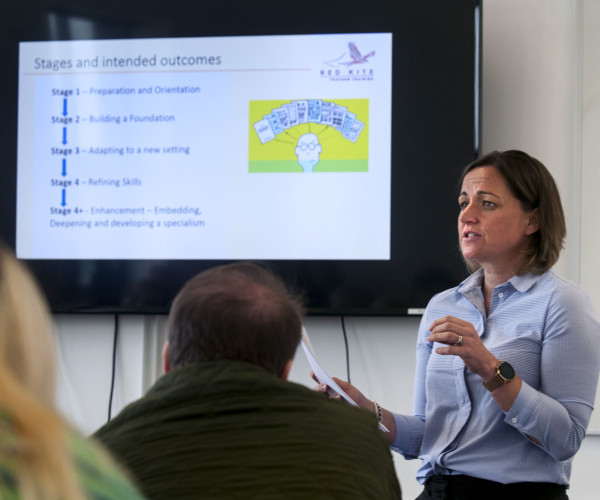Charlotte Taylor, NPQ Leading Literacy
The Reading Revolution:
A Case Study on the NPQLL's Impact on Reading at Allerton Grange School
I aspired to take part in the NPQ in Leading Literacy to develop my knowledge and expertise to implement effective strategies to support children in developing their reading and writing. As a Teacher of English, this is something that I am immensely passionate about. I had also recently taken on the role of Reading Lead which involves designing and implementing a whole school reading curriculum (DEAR) to instil a love for reading across our school community.
Having participated in the NPQLL over the past year, I am thrilled to share my personal experience and the impact it has had on both my own professional development and the overall improvement of reading and literacy in our school.
The NPQLL has provided me with a deeper understanding of the research and best practice in promoting literacy skills. The modules on reading have been particularly helpful; I've learnt more about what it means to be a fluent reader (reading with and for meaning) and, due to its importance, how to support colleagues develop students' levels of fluency.
Through the NPQLL, I have discovered the reading fluency expert: Dr Tim Rasinski and have been able to develop my knowledge further by attending additional reading conferences (for instance, The Art and Science of Teaching Reading by Tim Rasinski).
In addition to this, I have been able to meet other educators from local primary and secondary schools, discuss our current literacy strategies and make informed decisions about future interventions. I have been able to develop links with Literacy/Reading Leads from primary schools to find out more about the programmes in place to support word recognition and language comprehension, prior to children joining us in Year 7.
Within the modules, there is a strong emphasis on developing leadership skills - equipping Literacy Leads with the tools needed to motivate and inspire colleagues. I have been able to implement what I have learnt by delivering CPD on the importance of reading and reading fluency to my colleagues in the English department.

Slide from CPD
Further to this, the knowledge and skills acquired through the NPQLL have inspired me to re-design our reading lessons at Allerton Grange School. From September 2023, we will be incorporating 'Fluent Readers' into our weekly sessions:
Refining Library Lessons → Incorporating Fluent Readers
Aim: To ensure pupils have the opportunity to develop fluency through regular and monitored reading during weekly reading lessons.
We know that fluent reading supports comprehension because pupils’ cognitive resources can be redirected from focusing on word recognition to comprehending the text, so what will Fluent Readers sessions look like?
- 10 minutes of the session will involve a teacher-led discussion to activate prior knowledge of the chosen text (a poem), followed by modelling reading and using the comprehension strategies throughout. There will also be the opportunity for students to practise reading as a class through choral reading and/or guided oral reading instruction.
- Another 5-10 minutes of the session will allow students to practise their fluency of the same text in groups of 3.
- Jones (2022) highlights the importance of considering how students are grouped when teaching fluency, and that there are clear and established routines in place for students. For example, Jones (2022) suggests pairs or triads work best for her school’s context. The most fluent readers are paired with a ‘middle’ fluent reader. Students who have very low levels of fluency join the pair of fluent readers and make a triad. This is so that students successfully work together – learning from each other and with each other.
- Having practised both comprehension (by discussing the text with the teacher) and fluency skills (through choral reading and explicit practice), the remaining 30 minutes of the lesson on Reading Plus.
By going beyond the page, we aim to empower learning through the art of reading aloud.



